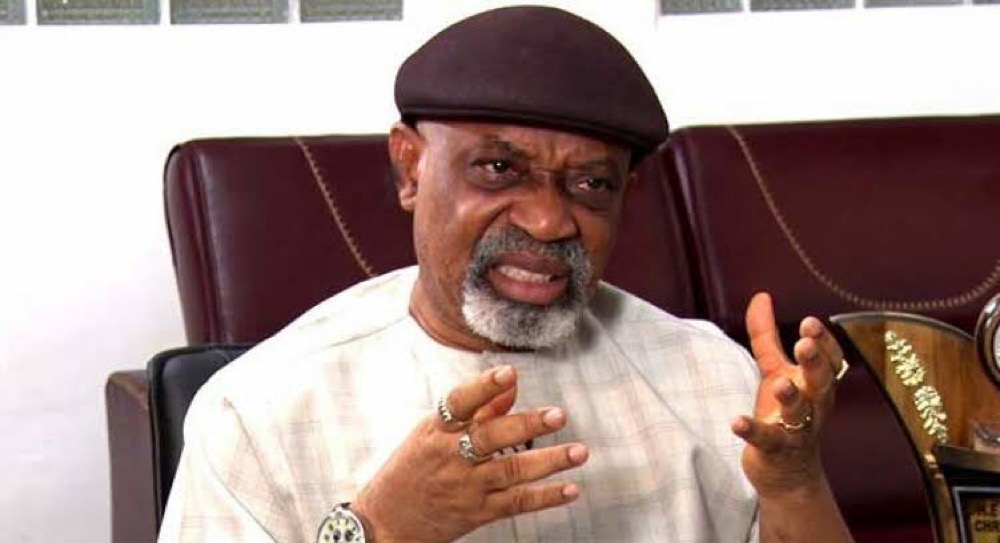The Minister of Labour and Employment, Chris Ngige has referred to the ongoing ASUU strike as a ‘recurring decimal’.
He said that there are only about 15 months between the last strike action by the Union and the ongoing one.
Advertisement
Ngige said this during an interview on Channels television.
“ASUU Strike is a recurring decimal in the history of Nigeria. In the last 20 years, they have gone on strike more than 16 times.
“My take is that it’s a very sad situation, I’m a product of public universities, so I do not know why we have fallen this low,” he said.
The Minister said the strike ending is wholly dependent on ASUU.
Advertisement
“It depends on ASUU, the ball is in their court. They should go and meet the committee, look at what the committee is doing and make further input so that the work can be accelerated,” he said.
Ngige said he is committed to the issue and is working to ensure the strike comes to an end.
He said the renegotiation committee has been given a 6-week timeline to convene with ASUU, after the meeting it had with the Federal Government on the 11th of April.
“I have not slept, I am working. I have told the committee that they were given 6 weeks.
“ASUU knows that they have a 6-week timeline and they have refused to go there. My work is to push the committee and beg ASUU,” he said.
Advertisement
Ngige called on the Union to stop threatening government officials.
“ASUU has to come down from their high horse. You cannot go and start intimidating people in NITDA and threatening the Minister of Digital Economy and Communication with revocation of his professorship that he is a fake professor.
“You go to ABU and say you are going to withdraw the certificate of the director of NITDA. That’s bullying. It is not allowed in the labour negotiations,” he stated.
He concluded by saying there would be a meeting with all stakeholders involved to attempt to bring an end to the strike.
Prior to this, the ASUU President, Emmanuel Osodeke, criticized the government for not prioritizing the education sector in its affairs.
Osodeke wondered how the government could raise N4 trillion for fuel subsidy but is unable to raise N200 billion to revamp Nigerian universities to world standards.
Advertisement
“It is always funny that the government cannot raise N200 billion to revamp all of Nigeria’s universities annually, to world standards. The same government can raise N4 trillion for fuel subsidies.
“You can raise a budget to make N4 trillion for subsidy in a year, but you cannot raise N200bn to fund your education where you don’t have the infrastructure. You can spend N228bn to feed children in primary or secondary schools but you cannot raise this fund for your university; it is an issue of priority. That is the problem,” he said.
Osodeke said the government should take N200 billion out of the N4 trillion earmarked for fuel scarcity to address the needs of the Union and Nigerian varsities in general.
“If you remove N200bn from N4 trillion to fund your universities, you still have N3.8trillion for fuel subsidy.
“We don’t believe there is a fuel subsidy. There is no country where you have the crude intelligentsia. You have been importing fuel for the past 20 years; something is ongoing. No country in the world will do that. In the 60s, we built four refineries, and between 1999 and now, we cannot build one or service the ones we had,” he said.
ASUU had commenced a warning strike on February 14, 2022, to intensify its demands which include the renegotiation of its 2009 agreement with the government and deployment of the University Transparency and Accountability Solution (UTAS) to replace the Federal Government’s Integrated Personnel Payroll Information System (IPPIS).
On March 14th, the Union extended the strike by two months, until May 14th, indicating that the strike is not a fresh one but rather a continuation of the 10-month strike which began in March 2020 and was suspended on December 23, 2020.
ASUU President, Emmanuel Osodeke, had told THE WHISTLER in an interview that the strike might be extended by 4 months if the government fails to meet the union’s demands before the proposed end of the current one.
The Federal Government met with ASUU for the first time since they commenced the strike on April 11th, where the Minister for Labour and Employment, Dr. Chris Ngige, said he was working to see that all issues are resolved amicably.
Other demands by ASUU include payment of earned academic allowances, funds for the revitalization of public universities, promotion arrears, and poor funding of state universities.
ASUU has also insisted on the release of the reports of the government’s visitation panels to federal universities and regular payment of salary to lecturers.



